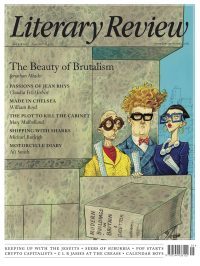Peter Davidson
Go Forth and Proselytise
The Jesuits: A History
By Markus Friedrich (Translated from German by John Noël Dillon)
Princeton University Press 854pp £30
As you progress through a typical day in Britain or western Europe, consider how many of the things you take for granted were introduced in the early modern era by the world-travelling members of the Society of Jesus, or Jesuits. Tea for a start: it arrived in Europe from Jesuit missions in the Far East. Then there is marmalade: an early recipe for a citrus conserve is to be found in the treatise Hesperides, published in the 1640s by the Italian Jesuit Giovanni Battista Ferrari, who also provides an excellent lemonade recipe (the curious may wish to consult his De Florum Cultura to discover Jesuit gardens and flower arrangements). The first repeat-flowering roses came to Europe with the Jesuits – Montaigne saw one in the Jesuit house in Ferrara as early as the 1580s. Gin and tonic owes its origins to the Jesuits too: quinine, the crucial flavouring of the mixer, was first known in Europe as pulvis Jesuiticus (‘Jesuit powder’). Consider also cinema: in the 17th century the Jesuits exhibited projected images by moving a lamp behind a lens. Indeed, I type this review on the remote and infinitely more sophisticated descendant of the rudimentary punch-card proto-computer, the organum mathematicum, which was to be found in the museum of the Collegio Romano in the 1670s.
This elegant English-language translation of Markus Friedrich’s comprehensive history of the Jesuits is particularly welcome: the Anglophone reader has often been persuaded to think ill of the Jesuits of the past, even if they see the Jesuits of today as a ‘progressive, innovative, and unconventional branch of the

Sign Up to our newsletter
Receive free articles, highlights from the archive, news, details of prizes, and much more.@Lit_Review
Follow Literary Review on Twitter
Twitter Feed
Richard Flanagan's Question 7 is this year's winner of the @BGPrize.
In her review from our June issue, @rosalyster delves into Tasmania, nuclear physics, romance and Chekhov.
Rosa Lyster - Kiss of Death
Rosa Lyster: Kiss of Death - Question 7 by Richard Flanagan
literaryreview.co.uk
‘At times, Orbital feels almost like a long poem.’
@sam3reynolds on Samantha Harvey’s Orbital, the winner of this year’s @TheBookerPrizes
Sam Reynolds - Islands in the Sky
Sam Reynolds: Islands in the Sky - Orbital by Samantha Harvey
literaryreview.co.uk
Nick Harkaway, John le Carré's son, has gone back to the 1960s with a new novel featuring his father's anti-hero, George Smiley.
But is this the missing link in le Carré’s oeuvre, asks @ddguttenplan, or is there something awry?
D D Guttenplan - Smiley Redux
D D Guttenplan: Smiley Redux - Karla’s Choice by Nick Harkaway
literaryreview.co.uk